The good news? You can often get valuable feedback simply by asking in the right way.
Learning how to request feedback professionally can transform rejections into learning opportunities. Most organisations want to help qualified candidates and contributors develop, but they don’t always offer feedback automatically due to time constraints or legal considerations. A well-crafted feedback request demonstrates professionalism, genuine interest in improvement, and respect for the reviewer’s time.
In this guide, you’ll discover proven strategies for asking organisations for constructive feedback on your submissions. We’ll cover when to ask, how to phrase your request, what questions to include, and email templates you can adapt for different situations. By the end, you’ll know exactly how to turn every “no” into actionable insights that strengthen your future submissions.
Why Most People Don’t Get Feedback (And Why You Should Ask)
If you’ve ever wondered why organisations rarely provide feedback on rejected submissions, you’re not alone. The silence after a “no” isn’t personal. Understanding why feedback is withheld can help you craft requests that actually get responses.
The Real Reasons Organisations Don’t Offer Feedback
Lack of structured feedback systems means many organisations don’t have processes in place for providing meaningful responses. Without clear guidelines on what feedback to give or how to deliver it constructively, many reviewers default to saying nothing rather than risking unhelpful or potentially harmful comments.
Volume overwhelm affects grant bodies, publications, and competitive programmes especially. When organisations receive thousands of submissions, the administrative burden of providing individual feedback becomes enormous, even when reviewers want to help applicants improve.
The Missed Opportunity (For Both Sides)
This feedback gap represents a massive missed opportunity. Candidates who receive constructive feedback are more likely to reapply to the same organisation and recommend it to others, even after rejection. Meanwhile, applicants lose valuable insights that could dramatically improve their future success rates.
Why You Should Ask Despite the Odds
You stand out immediately. Simply requesting feedback demonstrates professionalism, resilience, and a growth mindset—qualities that organisations value. Even if they can’t help this time, you’ve made a positive impression for future opportunities.
Response rates are higher than you think. While organisations don’t offer feedback automatically, many may provide it when asked directly.
Small improvements yield big results. Even brief feedback can highlight critical issues you might never have noticed. One insight about your portfolio format, writing techniques, or proposal structure could be the difference between future rejections and acceptances.
You build relationships, not just skills. Thoughtful feedback requests can start conversations with industry professionals who remember your professionalism and may consider you for future roles or recommend you to colleagues.
Crafting Your Feedback Request
Your request should acknowledge the realities of open call administration whilst making it easy for organisers to help you.
Subject Line Examples:
- “Feedback Request: [Your Name] – [Open Call Name]”
- “Following up on [Open Call Name] submission”
- “Brief feedback on my [Programme Name] application”
Email Structure:
Opening paragraph: Thank them for the opportunity, acknowledge the decision professionally, and reference your specific submission clearly (include your submission title or reference number).
Middle paragraph: Ask 1-2 specific questions that require minimal effort to answer. Avoid asking them to review your entire submission again or provide lengthy critiques.
Closing paragraph: Express understanding that they may not be able to respond due to volume, thank them for their time, and express interest in future opportunities.
Effective Questions for Open Calls
Questions that work well:
- “Was my submission reviewed by the full panel, or was it eliminated in an earlier round?”
- “Were there any technical issues with my submission format or materials?”
- “What was the main factor that led to submissions being declined?”
- “Would you encourage me to apply again in future calls?”
- “Were there common strengths you noticed in selected submissions that might guide my development?”
Questions to avoid:
- “Why wasn’t my work selected?” (too broad and potentially confrontational)
- “Can you review my portfolio and tell me what’s wrong with it?” (too time-intensive)
- “Who was on the selection panel and what did each person think?” (inappropriate and unrealistic)
- “Don’t you think my work was better than [selected artist]?” (unprofessional and argumentative)
Sample Email Template
Subject: Feedback Request: [Your Name] – [Open Call Name]
Dear [Organiser Name/Selection Panel],
Thank you for the opportunity to submit to [Open Call Name]. Whilst I was disappointed not to be selected this time, I greatly appreciated the chance to share my work with you.
I’m committed to developing my practice and would be grateful for any brief feedback that might help me strengthen future applications. I understand you received a large volume of submissions, so even a sentence or two would be invaluable.
Specifically, I wondered:
- Was there a particular aspect of my submission that you felt could be improved?
- Would my work be appropriate for future calls with [Organisation Name]?
I completely understand if your workload doesn’t permit individual feedback. Thank you again for your time and consideration. I look forward to following [Organisation Name]’s future programmes.
Best regards, [Your Name] [Your submission title/reference number]
Remember that open calls are highly competitive, and rejection is normal even for exceptional work. Curators and selectors often recall professional, gracious applicants who took rejection well and requested feedback thoughtfully. Your reputation in creative and professional communities matters, and how you handle rejection is part of building that reputation.
By approaching feedback requests strategically and respectfully, you transform each application – successful or not – into a learning opportunity and a chance to build meaningful professional relationships.

Bethan Jayne Goddard
Want us to write more content like this? Give it a like
Share














